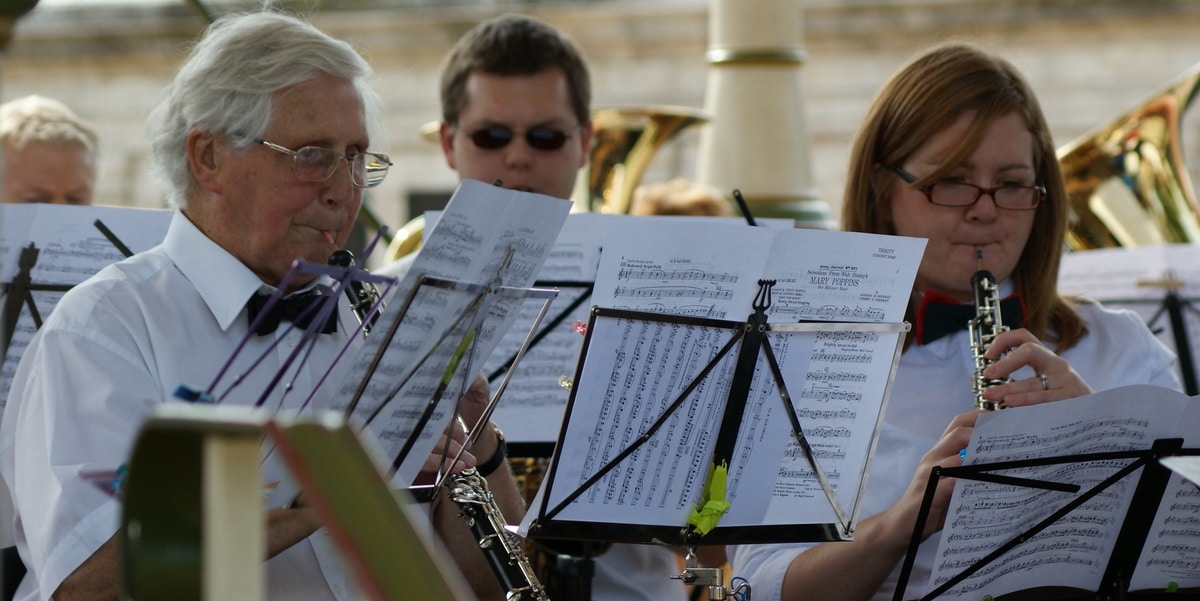Orchestral excerpts are an integral part of becoming an advanced musician. They are used for auditions all around, and can be used to further improve your musicianship.
Like all orchestral excerpts, oboe excerpts are used for auditions to show the technical level, musicianship, and knowledge of the player. These challenging excerpts from the orchestral oboe repertoire stretch players, and are known for their memorable melodies.
Let’s explore what oboe excerpts are, where to get them, and how to best prepare them!
What are excerpts?
Like I mentioned above, oboe excerpts are taken from larger orchestral works and used for auditions.
Most notably, they are used for professional orchestral auditions for both roster spots and sub-list positions.
These excerpts are used because they take an extraordinary amount of technical ability, musicality, and knowledge to execute correctly.
For oboe, some of the most popular excerpts are from Rossini's La Scala de Seta, Brahm's Violin Concerto, Beethoven's Symphony Number Three, Rimsky-Korsakov’s Scheherazade, and many more.
Holy Grail Excerpt Book
A standard excerpt book for oboists is Orchestral Excerpts for Oboe by John Ferrillo. This book is second to none and is chock full of wisdom.
Currently the Principal Oboist of the Boston Symphony Orchestra, Ferrillo knows the audition scene well. He has studied the orchestral excerpts thoroughly.
Throughout the book, he provides his best audition advice, techniques to improve your playing, and more.
The most beneficial part of the book is where he gives his thoughts on the preparation, presentation, and performance of each excerpt.
Not only do you get accurate printed music, but you also get the information surrounding each excerpt. This book would be a wonderful addition to your audition preparation.
How do you prepare excerpts?
There are many different approaches to preparing excerpts. I would recommend a combination of a number of the following methods because that will yield the best results.
Here are some of my favorite ways to study and prepare oboe excerpts for auditions. There are so many more out there - it’s important to find the right methods for yourself.
Listen To Recordings
Before you start anything, I would recommend sight-reading the excerpts first. See what you naturally want to do musically and do a little bit of individual exploration.
After sight-reading, I like to go directly to the table work. Listen to lots of recordings both of a full orchestra and then just oboists playing the shorter segments.
Get to know the music itself - can you hear the other things going on? Are you accompanying a flute there? Are you playing the most prominent role in the music?
These questions are so important to ask yourself and will inform what you do musically. When at an audition, the people listening will look for your knowledge of the greater work in the way you play the excerpt.
You should be able to hear the orchestra in your head as you play the excerpt. You should know the music that well.
As you listen to recordings, keep a chart with the tempo taken by each recording, the dynamic contrast, the amount of rubato taken, the type of vibrato, etc.
After completing the chart, you will have the information needed to make an educated decision on tempo, etc. The background research is crucial.
Once you decide on those factors, mark up your excerpt with everything you want to do. Write in your goal tempo and what each excerpt feels like.
In an audition, you have to switch moods at the drop of a hat, so it helps to write a word at the top that gets you into the right mindset.
Similarly, the nerves will get to you in an audition. The more useful information you have written down on the page, the less you have to remember internally.
Metronome
The metronome is your friend. I was never a huge fan of it until I was working on challenging repertoire such as orchestral excerpts.
Really, the metronome is an essential tool to becoming a solid, reliable player. You can keep track of your progress on a particular section, and use it to provide structure to your practice sessions.
My favorite thing about metronomes is that you can set a concrete goal for yourself using that as your measurement tool.
You can test yourself to see where you can play an excerpt cleanly and then build from there. You can choose to have something like a goal of increasing by 2 bpm every day, which provides structure and helps to keep you motivated.
This is exactly like a runner having a goal of shaving down a couple of seconds off of their mile time, or an athlete having a goal for how much they can squat.
These people have very clear goals that are accessible because they can measure it. The best goals are specific ones.
As I talked about above, you need to establish your goal tempo for an excerpt. A metronome will help you to start off at the right tempo, and then stay there steadily.
The more you practice with it, the more it will be ingrained into your brain. You are going to need a way to get the tempo from nothing. You want to communicate your preparedness and knowledge to the panel of people listening to you.
For me personally, I know that Stars and Stripes Forever is 120 bpm. I base many excerpt tempos off of that alone.
You may find that you know another piece or song really well, and that works better for you. Great - do what works for you!
Record Yourself
Recording yourself in your practice sessions is another way that you can find data. This is actually my favorite tool for practicing, and all you need is your phone!
After all of the work you did to find out what you want to do musically, now is your chance to see if that is coming across in your playing.
Sometimes you think you exaggerate something to a certain extent, but it doesn’t come across in the same way. By recording yourself, you get the chance to be on the other side of the audition.
You can make more knowledgeable adjustments with the information you get from listening back to the recordings.
However, I don't record every single one of my practice sessions. I also don't use a metronome every practice session.
For me, it's more like a different type of workout every day. I get to do my weightlifting and film review on different days. It's important to mix it up so that you stay engaged, and the effectiveness of the tools sustains.
Mock Auditions
When you are approaching your audition, play in front of people a number of different times.
The feedback that you receive from doing a mock audition is priceless because it gives you a different perspective other than your own.
I like to do mock auditions with people that know a lot about the oboe and its respective excerpts, as well as people that don't have much knowledge about oboe in particular.
You will receive different types of feedback from the different people, which will give you a lot to consider. Sometimes it takes a trumpet player to get you to look at something differently, whereas another oboist would bring the previous knowledge of the actual music and the instrument itself.
You don't need to take every piece of feedback and make a change - you just need to be able to justify your choices and consider what other people have to say.
You also get the opportunity to feel what it's like to play the entire audition all the way through. Endurance and pacing are definitely a challenge in auditions.
The more times you get to do an "audition" before the real thing, the less intimidating the actual thing will be. You know how it feels and because you have done it a number of times, it won't feel out of the ordinary.
Concluding Thoughts
Auditions are an art of showing your skill and individual ideas as a musician without coming across as a diva.
Avoid being a "diva" by being well researched and prepared. I find a lot of comfort in being extremely prepared for things; it will always put you in the best possible position.
Like any solo piece, excerpts require a significant amount of time to work up and perfect. Allow time for the research, sprinkling in recording yourself and playing in front of other people, as well as time for it to just sit and develop.
Enjoy getting to know some of the best music ever written for the oboe, and as always, happy practicing!






